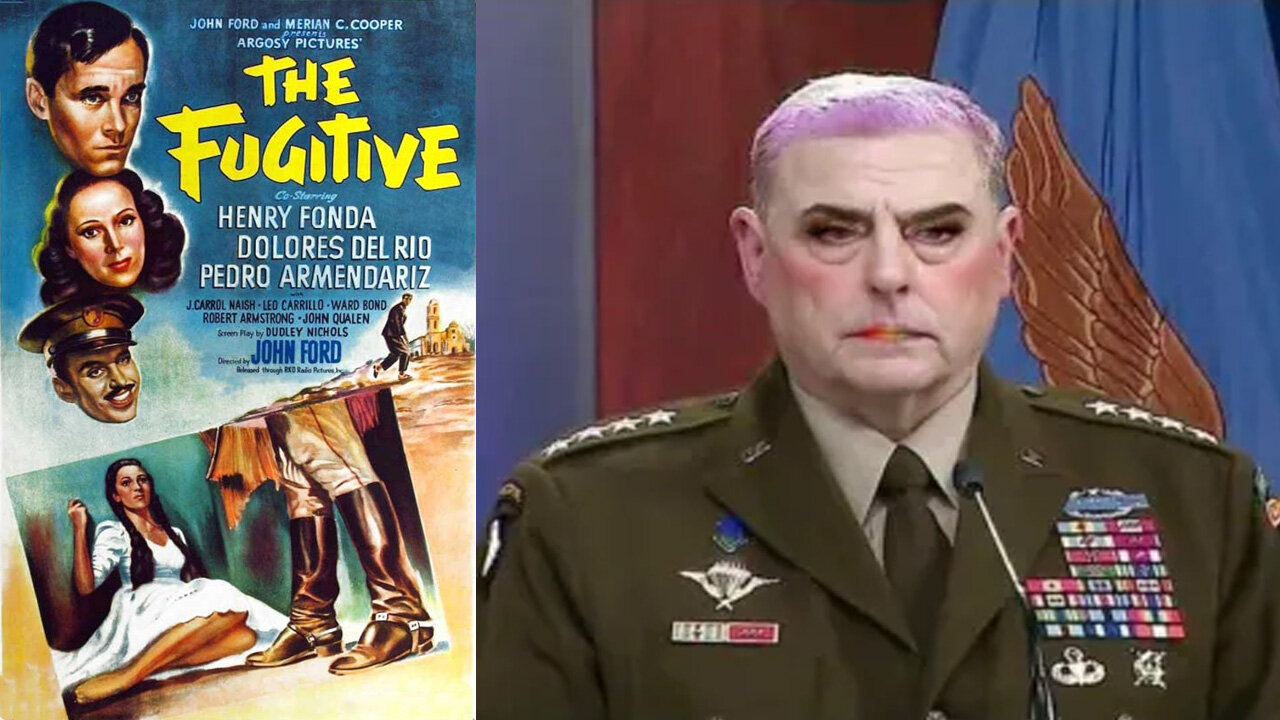Premium Only Content

'The Fugitive' (1947) Movie of the Book by Graham Greene
This might be the shitest film every made. The music is sickening.
'The Fugitive' (1947) is a film directed by John Ford, based on Graham Greene’s 1940 novel The Power and the Glory. While the film takes creative liberties with the story, it retains the novel’s themes of faith, guilt, and moral struggle in the face of persecution. It stars Henry Fonda as the unnamed priest (referred to as the fugitive) and Pedro Armendáriz as the ruthless police lieutenant pursuing him.
The film is set in an unnamed Latin American country (closely resembling Mexico during its anti-clerical period) where the government has outlawed organized religion and persecuted Catholic priests. Henry Fonda plays a humble and flawed priest who remains in the country despite the threat of execution. While many clergy have fled or been executed, he stays to offer the sacraments in secret, burdened by his sense of duty and personal guilt over his human failings.
The central conflict revolves around the priest’s moral and spiritual journey as he evades capture. He is pursued relentlessly by Pedro Armendáriz’s character, a police lieutenant who sees the Church as a symbol of oppression and is determined to eradicate it. Despite his flaws—including a struggle with alcohol and fathering an illegitimate child—the priest continues to perform his religious duties, believing that abandoning the faithful would be a greater sin.
Throughout his journey, the priest encounters ordinary people who both aid and betray him. One key figure is Dolores del Río’s character, a mysterious woman who reflects the tension between faith and fear in a society under oppression. The film portrays the priest’s internal conflict as he questions his worthiness while continuing to risk his life for his faith.
The film culminates in a tragic yet redemptive conclusion. Despite his efforts to escape, the priest is ultimately captured and executed. However, his sacrifice highlights the endurance of faith—implying that spiritual belief cannot be eradicated by political power. In the final scene, another priest arrives in the village, suggesting that the Church will persist despite persecution.
While The Fugitive softens some of Greene’s darker moral complexities, it remains a meditation on faith under fire. The film emphasizes themes of sacrifice, moral imperfection, and spiritual redemption, aligning closely with Greene’s original vision.
Critically, the film received mixed reviews. It was praised for Henry Fonda’s restrained performance and John Ford’s atmospheric direction, which captures the harsh, oppressive landscape. However, some critics felt it lacked the novel’s psychological depth and political nuance, reducing Greene’s moral ambiguities to a more straightforward tale of faith and martyrdom.
In summary, The Fugitive (1947) is a somber and reflective drama that explores the resilience of faith in the face of oppression, anchored by strong performances and John Ford’s signature visual storytelling.
-
 56:48
56:48
The HotSeat
13 hours agoI'm NOT Sorry! Guns Aren’t the Problem—Godless Culture Is
32.3K30 -
 9:43
9:43
The Pascal Show
15 hours ago $0.52 earnedWHOA! Annunciation School Sh**ter Identified... Heartbreaking & Insane
4.98K2 -
 22:42
22:42
Liberty Hangout
9 hours agoCollege Democrats Say Gangs Are GOOD!
78.3K68 -
 2:14:50
2:14:50
Badlands Media
14 hours agoBadlands Media Fantasy Football Live Draft
46.4K1 -
 2:12:29
2:12:29
Inverted World Live
8 hours agoWe Are Time Travelers | Ep. 100
88.7K13 -
 2:57:09
2:57:09
TimcastIRL
9 hours agoCorporate Press Refuses To Mention Minneapolis Shooter Was Trans | Timcast IRL
196K103 -
 5:26:57
5:26:57
Akademiks
8 hours agoWar in RAT-LANTA. Young Thug vs Gunna vs Ralo vs YSL MONDO. Who Will Le Bebe Pick. FINAL CRASHOUT!
62.2K6 -
 1:02:24
1:02:24
Man in America
12 hours agoThe Final Battle: Nanotech, Transhumanism & the War for Your Soul w/ Dr. Ed Group
50.6K7 -
 39:56
39:56
Sarah Westall
6 hours agoUpcoming World Wide Economic Collapse/Deep Recession & What the Big Money is Doing w/ Ed Dowd
48.5K5 -
 2:52:55
2:52:55
Barry Cunningham
7 hours agoIT'S MOVIE NIGHT WITH BARRY!
54K29